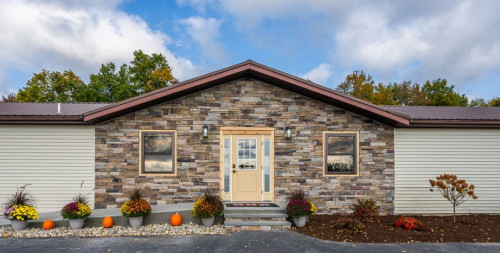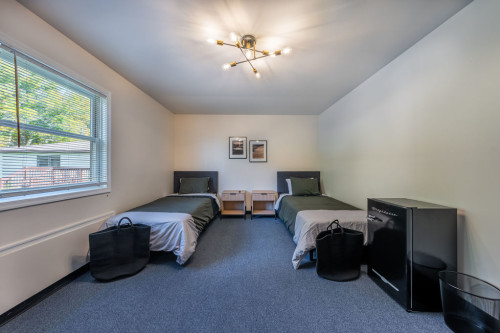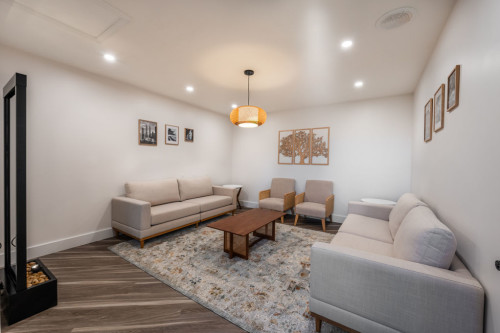






Woodhaven Recovery
Treatment Focus
This center treats substance use disorders and co-occurring mental health conditions. Your treatment plan addresses each condition at once with personalized, compassionate care for comprehensive healing.
Primary Level of Care
Offering intensive care with 24/7 monitoring, residential treatment is typically 30 days and can cover multiple levels of care. Length can range from 14 to 90 days typically.
Claimed
Recovery.com has connected directly with this treatment provider to validate the information in their profile.
Treatment Focus
This center treats substance use disorders and co-occurring mental health conditions. Your treatment plan addresses each condition at once with personalized, compassionate care for comprehensive healing.
Primary Level of Care
Offering intensive care with 24/7 monitoring, residential treatment is typically 30 days and can cover multiple levels of care. Length can range from 14 to 90 days typically.
Private Pay
You pay directly for treatment out of pocket. This approach can offer enhanced privacy and flexibility, without involving insurance. Exact costs vary based on program and length of stay. Contact the center for specific details.
Woodhaven Recovery
Woodhaven Recovery
About Woodhaven Recovery
Woodhaven Recovery is designed for adolescent extended care. They focus on helping teen boys overcome substance use disorders by offering a comprehensive treatment approach that combines evidence-based practices with holistic support. They foster an atmosphere of personal growth and healing, empowering boys to discover purpose, fulfillment, and the skills to lead meaningful, successful lives.
Woodhaven Recovery has 3 pillars to their program: recovery principles, clinical engagement, and academics. These 3 aspects make up 38 weekly program hours. Woodhaven Recovery is a 12-Step based program and clients work with certified recovery specialists on a weekly basis. Additionally, all clients have a clinical team that includes a therapist, group therapist, and psychiatrist who provide them with virtual 1:1 sessions and 2 weekly group sessions following the Seeking Safety curriculum. Recreational activities balance out the rigorous clinical and academic schedule. A full-time recreation coordinator plans regular onsite and off-site activities like bowling, laser tag, hiking, skiing, and more.
Woodhaven Academy
Woodhaven Recovery incorporates academics in their program through their school, Woodhaven Academy. This comprehensive high school program aligns with state and national standards, integrating recovery-based literature to support students' personal growth alongside their academic development. Certified teachers provide personalized instruction, collaborating with students' home districts to ensure continuity in education and facilitate a seamless transition back to their original schools.
Residential Life
Woodhaven Recovery offers a structured residential continuum for adolescents, comprising 3 distinct phases: Woodhaven Manor, Woodhaven Cottages, and Woodhaven on Mulberry. Each residence is designed to progressively teach recovery principles, life skills, and academic growth, supporting residents as they transition toward independence and sustained recovery. Students have either private or shared rooms, chef-prepared meals, and access to an onsite fitness center.
Center Overview
Treatment Focus
This center treats substance use disorders and co-occurring mental health conditions. Your treatment plan addresses each condition at once with personalized, compassionate care for comprehensive healing.
Pricing and Program Length
Estimated Center Costs
The cost listed here ($7,000/month), is an estimate of program cost. Center price can vary based on program and length of stay. Contact the center for more information. Recovery.com strives for price transparency so you can make an informed decision.
Levels of Care






Your Care Options
Specializations
Adolescents
Teens receive the treatment they need for mental health disorders and addiction, with the added support of educational and vocational services.
Drug Addiction
Drug addiction is the excessive and repetitive use of substances, despite harmful consequences to a person's life, health, and relationships.
Who We Treat
Adolescents
Teens receive the treatment they need for mental health disorders and addiction, with the added support of educational and vocational services.
Approaches
Individual Treatment
Individual care meets the needs of each patient, using personalized treatment to provide them the most relevant care and greatest chance of success.
Therapeutic Community
Therapeutic communities allow patients to contribute to the success and progress of their community, through healthy behaviors or even basic chores.
Twelve Step
Incorporating spirituality, community, and responsibility, 12-Step philosophies prioritize the guidance of a Higher Power and a continuation of 12-Step practices.
Gender-Specific
Separate treatment for men or women can create strong peer connections and remove barriers related to trauma, shame, and gender-specific nuances.
Therapies
1-on-1 Counseling
Patient and therapist meet 1-on-1 to work through difficult emotions and behavioral challenges in a personal, private setting.
Life Skills
Teaching life skills like cooking, cleaning, clear communication, and even basic math provides a strong foundation for continued recovery.
Motivational Interviewing
Based on the idea that motivation to change comes from within, providers use a conversational framework to discover personalized methods for change.
Recreation Therapy
In recreation therapy, recovery can be joyful. Patients practice social skills and work through emotional triggers by engaging in fun activities.
Twelve Step Facilitation
12-Step groups offer a framework for addiction recovery. Members commit to a higher power, recognize their issues, and support each other in the healing process.
Acceptance and Commitment Therapy (ACT)
This cognitive behavioral therapy teaches patients to accept challenging feelings and make the appropriate changes to reach personal goals.
Substances We Treat
Alcohol
Using alcohol as a coping mechanism, or drinking excessively throughout the week, signals an alcohol use disorder.
Co-Occurring Disorders
A person with multiple mental health diagnoses, such as addiction and depression, has co-occurring disorders also called dual diagnosis.
Drug Addiction
Drug addiction is the excessive and repetitive use of substances, despite harmful consequences to a person's life, health, and relationships.






